#ancient accounts of disease
Explore tagged Tumblr posts
Note
It's said Alexander fell sick & almost died after bathing in the ice cold Cydnus river on a very hot day.
What exactly happened to him? Did he catch a cold? Was it pneumonia? Or anything else?
I find no clear explanation anywhere.
What do you think might have happened that made a young, healthy & strong guy like Alexander so sick?
Alexander at the Cydnus River
We don't know.
At a guess, at last hypothermia would have been a problem. He was over-heated and jumped into super-cold water. That is not a good combination no matter how tough you are. But hypothermia doesn't cause a fever; it's a form of shock. So he may have been sick with something else--the beginnings of a fever, which just made him feel hotter.
That could have been malaria, judging from his symptoms, given that ancient Macedonia was rife with malaria, so most people raised there were probably carriers. It can flare up again. Malaria or typhoid are also the most likely culprits in what killed him, years later.
The problem is that the ancients didn't understand the causes of disease, so trying to guess what afflicted people can be tricky for two reasons:
The symptoms listed may not help much being attributed to an imbalance in "humors," PLUS
Disease is sometimes used in the sources to indicate MORAL decline (most famously with Sula and Herod). Ergo, the description of symptoms is suspect. Herod was supposedly killed by being eaten from within by worms. Yes, that can be a disease...but the meaning in his case was that the worms represented his moral decay.
I don't think #2 is a problem in this particular case. I think they simply assumed that the super cold water caused the illness. As noted, I'm sure it didn't *help*, but it's not what gave him the serious fever.
#asks#Alexander the Great#ancient accounts of disease#problems with ancient medicine#ancient Greek medicine#illnesses of Alexander the Great#Classics
11 notes
·
View notes
Note
Hi, sorry but I was wondering if you have any romantic or philosophical "ancient Greek" quotes/phrases/poems?
Thank you :)) I love your account btw its so helpful
Ancient Greek Proverbs & Phrases
“A gift consists not of what is done or given, but in the intention of the giver or doer.” (Seneca)
“Educating the mind without educating the heart is no education at all.” (Aristotle)
“Every heart sings a song, incomplete, until another heart whispers back. Those who wish to sing always find a song. At the touch of love, everyone becomes a poet.” (Plato)
“Eyes that don’t see each other frequently are soon forgotten.” - Μάτια που δεν βλέπονται γρήγορα λησμονιούνται (Proverb)
“For all great men, the entire earth is a tomb.” - Ανδρών επιφανών πάσα γη τάφος (Thucydides)
“Love consists of one soul that is living within two bodies.” - Η αγάπη αποτελείται από μία ψυχή που κατοικεί σε δύο σώματα (Aristotle)
“Love is a serious mental disease.” (Plato)
“Love without a bit of stubborness isn’t tasteful.” - Αγάπη χωρίς πείσματα δεν έχει νοστιμάδα (Proverb)
“Man—a being in search of meaning.” (Plato)
“No man ever steps in the same river twice, for it’s not the same river and he’s not the same man.” (Heraclitus)
“One word sets us free from all the weight and the pain in life. And that word is: love.” - Μία λέξη μας απελευθερώνει από όλο το βάρος και τον πόνο στη ζωή. Και αυτή η λέξη είναι: αγάπη (Sophocles)
“People are like dirt. They can either nourish you and help you grow as a person or they can stunt your growth and make you wilt and die.” (Plato)
“The tongue has no bones but it crushes bones.” - Η γλώσσα κόκαλα δεν έχει και κόκαλα τσακίζει (Proverb)
“The unexamined life is not worth living.” - Ο ανεξεταστος βιος ου βιωτος ανθρωπω (Socrates)
“Τhe world only exists when you can share it.” - Ο κόσμος μόνο όταν τον μοιράζεσαι υπάρχει (Tasos Leivaditis, Greek poet)
“There are two things a person should never be angry at: What they can help, and what they cannot.” (Plato)
“We can’t live with each other, neither can we live without one another.” - Εμείς μαζί δεν κάνουμε και χώρια δεν μπορούμε (Proverb)
“What you leave behind is not what is engraved in stone monuments, but what is woven into the lives of others.” (Pericles)
“When the mind is thinking, it is talking to itself.” (Plato)
“Wise men talk because they have something to say; fools, because they have to say something.” (Plato)
Sources: 1 2 3 4 5 ⚜ More: Writing Notes & References
Thanks so much for your lovely words! Hope this helps with your writing :)
#ancient greek#quotes#literature#writeblr#dark academia#spilled ink#writing reference#writers on tumblr#writing prompt#creative writing#writing inspiration#writing ideas#light academia#greek#philosophy#love#writing resources
185 notes
·
View notes
Text
Rhetoric has a history. The words democracy and tyranny were debated in ancient Greece; the phrase separation of powers became important in the 17th and 18th centuries. The word vermin, as a political term, dates from the 1930s and ’40s, when both fascists and communists liked to describe their political enemies as vermin, parasites, and blood infections, as well as insects, weeds, dirt, and animals. The term has been revived and reanimated, in an American presidential campaign, with Donald Trump’s description of his opponents as “radical-left thugs” who “live like vermin.”
This language isn’t merely ugly or repellant: These words belong to a particular tradition. Adolf Hitler used these kinds of terms often. In 1938, he praised his compatriots who had helped “cleanse Germany of all those parasites who drank at the well of the despair of the Fatherland and the People.” In occupied Warsaw, a 1941 poster displayed a drawing of a louse with a caricature of a Jewish face. The slogan: “Jews are lice: they cause typhus.” Germans, by contrast, were clean, pure, healthy, and vermin-free. Hitler once described the Nazi flag as “the victorious sign of freedom and the purity of our blood.”
Stalin used the same kind of language at about the same time. He called his opponents the “enemies of the people,” implying that they were not citizens and that they enjoyed no rights. He portrayed them as vermin, pollution, filth that had to be “subjected to ongoing purification,” and he inspired his fellow communists to employ similar rhetoric. In my files, I have the notes from a 1955 meeting of the leaders of the Stasi, the East German secret police, during which one of them called for a struggle against “vermin activities” (there is, inevitably, a German word for this: Schädlingstätigkeiten), by which he meant the purge and arrest of the regime’s critics. In this same era, the Stasi forcibly moved suspicious people away from the border with West Germany, a project nicknamed “Operation Vermin.”
This kind of language was not limited to Europe. Mao Zedong also described his political opponents as “poisonous weeds.” Pol Pot spoke of “cleansing” hundreds of thousands of his compatriots so that Cambodia would be “purified.”
In each of these very different societies, the purpose of this kind of rhetoric was the same. If you connect your opponents with disease, illness, and poisoned blood, if you dehumanize them as insects or animals, if you speak of squashing them or cleansing them as if they were pests or bacteria, then you can much more easily arrest them, deprive them of rights, exclude them, or even kill them. If they are parasites, they aren’t human. If they are vermin, they don’t get to enjoy freedom of speech, or freedoms of any kind. And if you squash them, you won’t be held accountable.
Until recently, this kind of language was not a normal part of American presidential politics. Even George Wallace’s notorious, racist, neo-Confederate 1963 speech, his inaugural speech as Alabama governor and the prelude to his first presidential campaign, avoided such language. Wallace called for “segregation today, segregation tomorrow, segregation forever.” But he did not speak of his political opponents as “vermin” or talk about them poisoning the nation’s blood. Franklin D. Roosevelt’s Executive Order 9066, which ordered Japanese Americans into internment camps following the outbreak of World War II, spoke of “alien enemies” but not parasites.
In the 2024 campaign, that line has been crossed. Trump blurs the distinction between illegal immigrants and legal immigrants—the latter including his wife, his late ex-wife, the in-laws of his running mate, and many others. He has said of immigrants, “They’re poisoning the blood of our country” and “They’re destroying the blood of our country.” He has claimed that many have “bad genes.” He has also been more explicit: “They’re not humans; they’re animals”; they are “cold-blooded killers.” He refers more broadly to his opponents—American citizens, some of whom are elected officials—as “the enemy from within … sick people, radical-left lunatics.” Not only do they have no rights; they should be “handled by,” he has said, “if necessary, National Guard, or if really necessary, by the military.”
In using this language, Trump knows exactly what he is doing. He understands which era and what kind of politics this language evokes. “I haven’t read Mein Kampf,” he declared, unprovoked, during one rally—an admission that he knows what Hitler’s manifesto contains, whether or not he has actually read it. “If you don’t use certain rhetoric,” he told an interviewer, “if you don’t use certain words, and maybe they’re not very nice words, nothing will happen.”
His talk of mass deportation is equally calculating. When he suggests that he would target both legal and illegal immigrants, or use the military arbitrarily against U.S. citizens, he does so knowing that past dictatorships have used public displays of violence to build popular support. By calling for mass violence, he hints at his admiration for these dictatorships but also demonstrates disdain for the rule of law and prepares his followers to accept the idea that his regime could, like its predecessors, break the law with impunity.
These are not jokes, and Trump is not laughing. Nor are the people around him. Delegates at the Republican National Convention held up prefabricated signs: Mass Deportation Now. Just this week, when Trump was swaying to music at a surreal rally, he did so in front of a huge slogan: Trump Was Right About Everything. This is language borrowed directly from Benito Mussolini, the Italian fascist. Soon after the rally, the scholar Ruth Ben-Ghiat posted a photograph of a building in Mussolini’s Italy displaying his slogan: Mussolini Is Always Right.
These phrases have not been put on posters and banners at random in the final weeks of an American election season. With less than three weeks left to go, most candidates would be fighting for the middle ground, for the swing voters. Trump is doing the exact opposite. Why? There can be only one answer: because he and his campaign team believe that by using the tactics of the 1930s, they can win. The deliberate dehumanization of whole groups of people; the references to police, to violence, to the “bloodbath” that Trump has said will unfold if he doesn’t win; the cultivation of hatred not only against immigrants but also against political opponents—none of this has been used successfully in modern American politics.
But neither has this rhetoric been tried in modern American politics. Several generations of American politicians have assumed that American voters, most of whom learned to pledge allegiance to the flag in school, grew up with the rule of law, and have never experienced occupation or invasion, would be resistant to this kind of language and imagery. Trump is gambling—knowingly and cynically—that we are not.
233 notes
·
View notes
Text
Doctor Strange's disability: a (much needed) chronological review
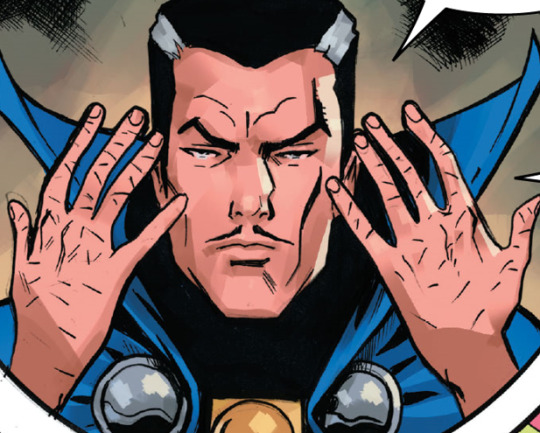
In view of recent ableism and drama on the other social hellsite involving Doctor Strange's disability, here's my response, based on *CANON* material. (link to the thread on said hellsite here)
Stephen disability is established since 1963, back in Strange Tales #115. The story is focused on a flashback which portrays his journey from the decay of his medical career because of a car accident to his path towards the mystic arts.
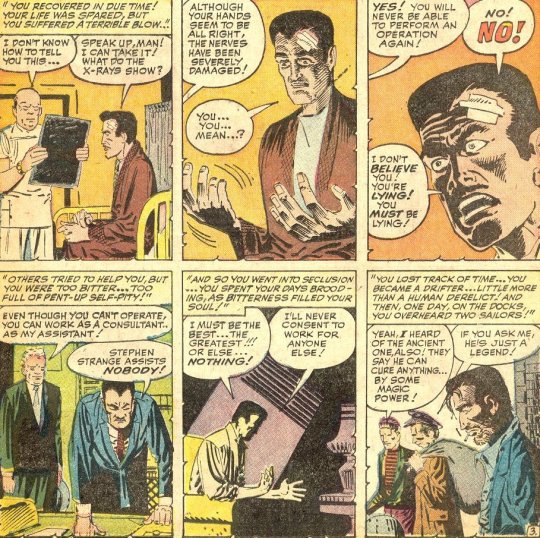
Note that, in this very same issue, the Ancient One never says he would heal Stephen's *hands*, but perhaps Stephen would find the cure within. In other words, Stephen was supposed to heal his heart and soul from arrogance and egoism through magic, not a physical cure.
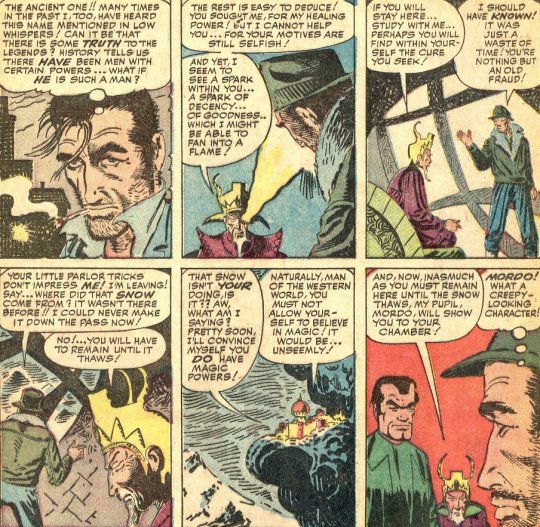
Also note that there are limitations within every aspect of comic books' universes. In this case, we're talking about magic. Magic is not a miracle thing. It demands training and, most recently as established by v4, a cost (Doctor Strange v4 #4).

Another clue that "magic can heal anything because it's fantasy" is not a valid argument within Marvel's magic world, as seen in The Oath. Stephen had access to the Otkid's Elixir, which could heal any disease, but the formula was lost in order to save Wong's life.
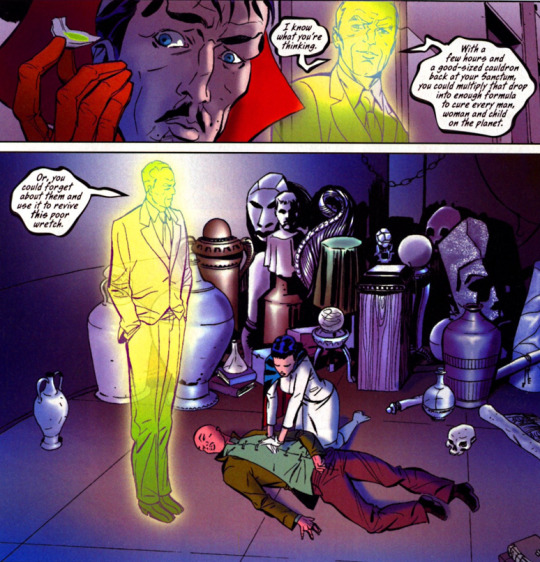
One last example comes from Spider-Man Family #5 (2007), featuring Morbius and Spidey. It establishes that healing demands the exact same price when it comes to magic.

Long story short, it's clear that the magic side of Marvel does not offer a solution to diseases through magical miracles. So this argument is totally invalid ~within~ this established universe.
Now back to Doctor Strange... No, he isn't using magic to heal his hands unlike some misleading accounts are claiming. In fact, there are several panels which show that he's actually in constant pain. Here's some examples:
- Doctor Strange - Sorcerer Supreme #48 (1992).

- Captain Marvel v10 #6 (2019)
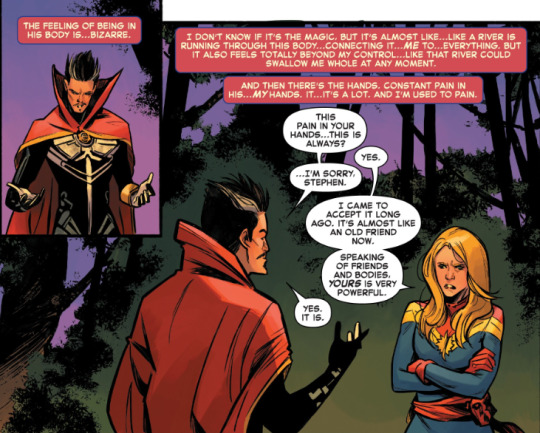
- Doctor Strange v4 #1 (2015)

He also struggles to hold a pen and write, relying on magic to do so, as seen in the Book of the Vishanti.
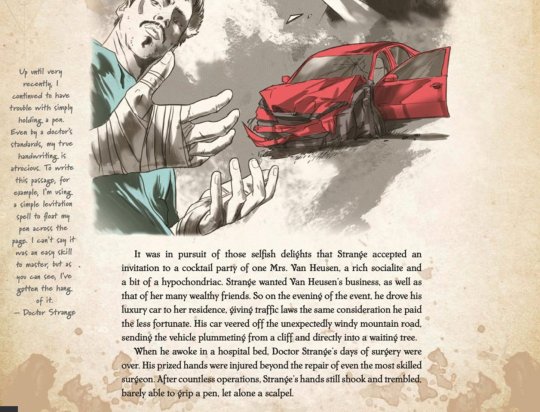
Then comes the stupid argument I saw.
"Oh, but Google says his hands are healed!" is not a gotcha moment you think it is. We had FOUR MAIN BOOKS after that (Surgeon Supreme, DODS, Strange v3 and current v6). Allow me to clarify the details in chronological order.

Stephen indeed made a "magic" gamble and healed his hands. That much is correct. But it's not all (panels from Doctor Strange v5 #19 - 2019).
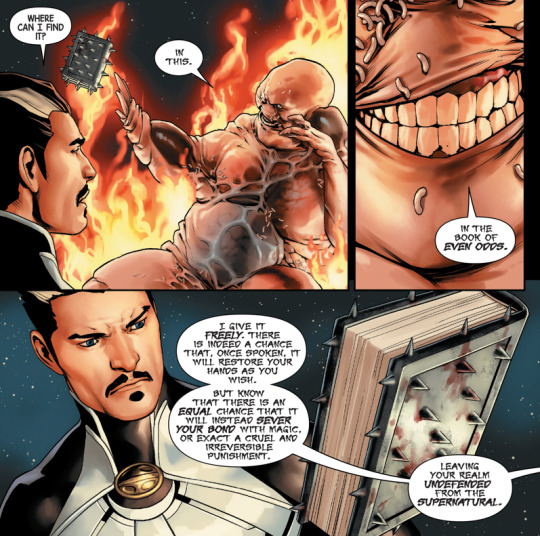
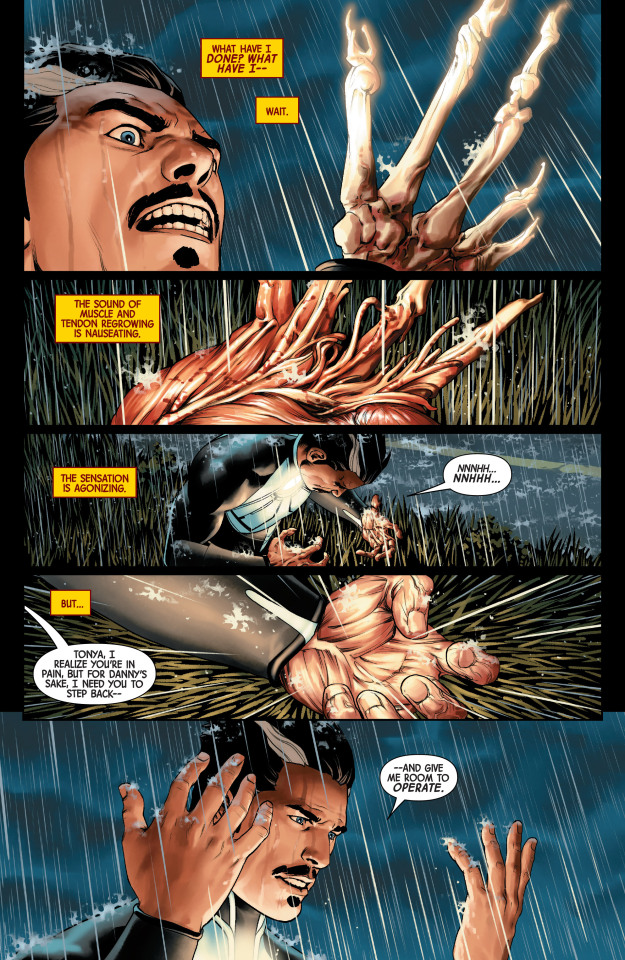
Waid continued this storyline in a new book called Dr. Strange (Surgeon Supreme), which would portray Stephen's duality as the Sorcerer Supreme and a brilliant surgeon. Except the book was cancelled at issue #6 (2020), leaving the character in a kind of limbo. Now enter MacKay.

MacKay kept a little bit of the former storyline as seen in Death of the Doctor Strange #1 (2021). On top of that, his hands appeared healed. However, that lasted only until Kaecilius murdered Stephen and stole his hands.

Stephen's temporal duplicate used a regenerative spell to bring original Stephen back through Kaecilius' body and the stolen hands. In here, we can see that his hands are scarred just like after the car accident (DODS #5 - 2022). OG Stephen died a second time with scars as well.
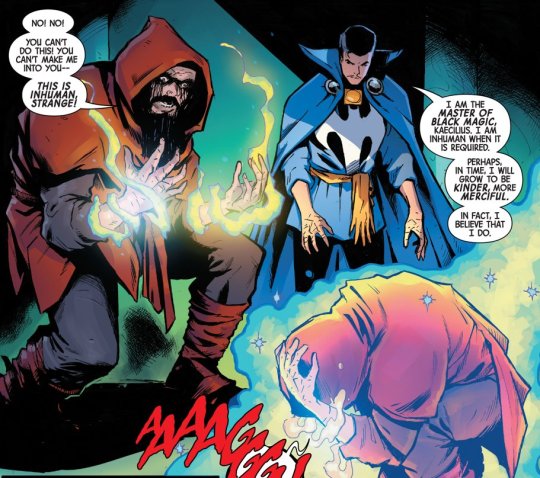

Stephen is indeed seen writing in v6 but it's not clear if he's using magic or not. Besides, he's not working as a surgeon anymore. Moreover, MacKay considers Stephen disabled as seen in this recent issue of v6 (#7 - 2023): "My own connection to the aether, the magic of the world, the power of the Vishanti, the power of the Sorcerer Supreme... Gone. Without all of that? I am just an old man with useless hands and a blade in his stomach."
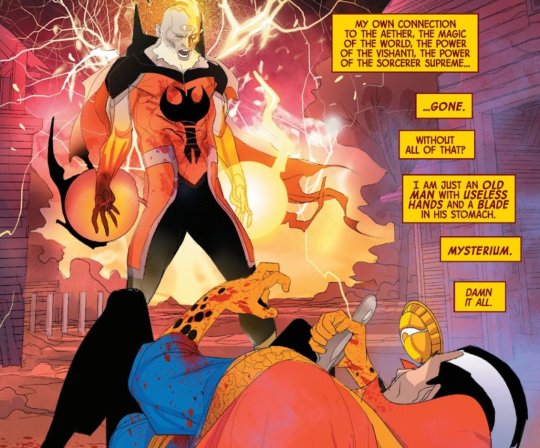
In conclusion,
As of CURRENT DOCTOR STRANGE RUN by Jed MacKay and Pasqual Ferry, in the year of our lord Vishanti, 2024, Stephen Strange is a disabled character and no magic or ableism will erase that. Thank you very much.
236 notes
·
View notes
Text
Good Omens - December reads part #1- fanfics recs 🤓🩷🎄
I ´ve decided to write a short summary each month about the books i read. I need this to let go of the stories, its a nice way of saying good-bye to them and to spread the love to the authors and to you. 🩷
I only read finished stories and rarely one-shots. You will find no WIPs in here, as i really like to dive deep into the plot and i keep losing track of WIPs. Also you will only find happy or at least hopeful endings here - i couldn´t handle anything else.
Thank you to @di-42 for inspiring me to do this with her own monthly review! 🤗 Check her out, she is an incredible author!
Also i try to find every author here on tumblr to link-to, but sadly some times i am out of luck. If you happen to know them, please tell them, write to me in the comments or DM me and i will update the post!
Multichapter Fanfics
Forbidden roman(ce) by WorseOmens
Sadly this story seems to have been deleted, also the author is not on AO3 at the moment. Maybe they have disabled or deleted their account. Its a pity, because it was a truly nice story.
It plays in ancient Rome. Crowley is living in a villa just outside Rome and "inherits" a slave from his uncle. For at first undisclosed reasons he tries to keep him away from his other slaves - and what other way is there than to spend time with him himself?
A nice story, only a bit angsty to me, and the last 2 chapters really cracked me to sobbing tears. I do so hope that the fic goes up again or that some of you might know the author and tell them about this. Maybe some of you have downloaded the story already (just like i had) and will still be able to enjoy it!
Lunacy by @snae-b
OMG - i have been a sucker for the whole Alien-Films for decades. If you know them (Sigourney Weaver - i mean how cool can you be stearing a hauling-robot to kill an alien?) - you know the feeling they produce.
This is exactly what this story is able to capture. Crowley is head of a mining-crew on the outer borders of the known space. Aziraphale is a geologist coming with them. The plot is an angsty pageturner which had me leave the light on at night. Just loved it and made its way to my re-read list. 👽
Love in the Garden by @tawnyontumblr
It´s the early 90ties, its UK and its gay. HIV and Aids are kind of a rumor, no one knows exactly what is going on. Aziraphale and Crowley find themselves right in the middle of it. This story is SO SO important, but please do mind the tags before you start. It will be a hard read. 🩷 To me it was very precious, this is exactly my teenager-time and i remember it all too well. Please remember i only rec stories with a happy ending! Apart from that - i am SO thankful for how far we have come concerning this disease.
Yes. Yes. Yes. Goodbye? by appleseeds
Human AU; Aziraphale is dragged to a Halloween-Haunted-Castle-"Party" by his friend Tracy. He clearly would rather curl up in bed with a book than being there, but thank Someone there is this beautiful stranger sitting across of him, who doesn´t seem to want to be here either. They go ghost-hunting through the castle - what will they find? 😅
The small ad by @theladydrgn and @sylwritesstuff
Tall, lanky ginger of arguable gender available to be your significant other ... This is the ad Crowley puts out and Aziraphale decides to call. With the family reunion ahead he doesn´t want to go there alone - again. Gabriel would be too much of a nuisance. You can imagine the rest!
I love the authors and have read more of their books in the past. They are always very easy to follow, funny and satisfyingly smutty. 🌶😁
Three two one, we go live by HazelSage
Crowley is falling in love with his secretary Aziraphale, while secretly being addicted to a camboy called "not an angel". What he doesnt know - Aziraphale has a secret side-hussle ...
The story is merely an excuse for writing lots of cam-scenes with Aziraphale having solo-sx for his fans-only-channel. Do mind the tags !! Plot-to-Smut-Ratio = 15:85 😁
Tastes by @tawnyontumblr
Aziraphale is bound to be wedded and searches Crowley´s help to become a rake so that his betrothed doesn´t want to marry him any longer. Love in regency times, gentle gender discussions in a time that no-one even knew or at least talked about it. Wonderful story that had me re-read whole pages because they were so touching. Also: very hot!
One-Shots!
Anthony J. Crowley, Retired Demon and Airbnb Superhost by @theoldaquarian
I found this story through another rec from @di-42 and it really had me laughing. Crowley rents his flat out as an Airbnb and here you can read what people say about it. Very funny! 😅 The author seems to have deleted their tumblr-account, so i couldn´t link them.
Naked and afraid: Jingle Hell by @klikandtuna
Crowley and Aziraphale don´t know each other, they participate in the same TV-Show, which is called "Naked and Afraid" and is set in the Jungle. It´s a survival show. The rest is a very funny plot exclusively consisting of banter and scene-descriptions.
Not really a One-Shot, it´s over 20k, but i stumbled in and it was just so funny that i kept on reading. Biggest laugh: "I’m about to lose a testicle to frostbite." 😅 A christmas-story you can read all year through.
Some strangeness in the proportion by @trailingoff
Set after the end of S1. Aziraphale has been punished by the "destruction of the demon" and he grieves deeply. He moves into Crowleys flat and just wants to be alone. If just this angel wouldn´t keep showing up, trying to help him overcome his feelings.
Loved this one, it was written before S2 and somehow i wonder if it doesn´t hit to the point with its message ... Also a bit longer for a one-shot with 11.500 words.
Puttin on the Ritz by @moonyinpisces
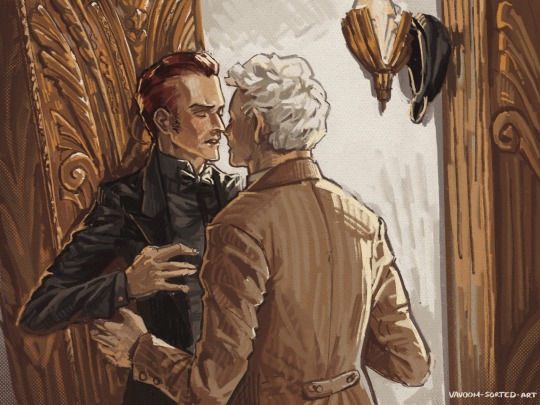
It´s New York, it´s the 1920ies and Aziraphale is on a heavenly mission, when he accidentally bumps into Crowley. As part of their arrangement Crowley decides to take over and Aziraphale gets to watch a demonic temptation for the first time. Will he be able to resist? A short, funny, fluffy smut story. 😉
Incredible Artwork by Zoe @vavoom-sorted-art 🩷
Green Light by @dragonfire42
After the second not-coming Aziraphale decides it´s time for him to finally "cum". He uses all the historical appropriate terms to tell Crowley his wish and can´t fathom why Crowley doesn´t understand. At least at first. When he does, 6000 years of pining break loose. Very funny!
All i want for christmas by @naromoreau
Oh i loved that story so much! Crowley is the single-dad to Warlock, Aziraphale the single-dad to Adam. They meet at school for the christmas-party of their kids, where Aziraphale also acts as Santa Claus and asks Crowley to help him dress up. How they end up in the janitory closet? Guess you have to find out! Very sweet and hot. 🎅🩷
So thats 13 fanfics in the first 8 days - wow. I never kept track of my readings this way and i am a bit surprised myself. thanks to all the wonderful authors for making my nights! 🤗
#good omens#good omens fanfiction#ineffable husbands#good omens fanfic rec#fanfic#i read my fanfics at night#thank you for your fanfiction
70 notes
·
View notes
Text

About Me
Hello everyone! My name is Green (she/her), I'm a Hufflepuff with a gremlin streak, and my hobbies include reading, writing, and collecting more books than I can read.
I primarily write humour, angst, fluff, and a bit of spice. At the moment all my work is Canon Character/ Reader OCs, who never have a name (only a nickname, no Y/N). I'm slowly working on porting everything over to tumblr, but you can check out the links to AO3 and Wattpad in the meantime.
As a quick note, I never copy game dialogue. Besides some iconic lines, all writing is original and entirely my own.

Tags & Info
My AO3 account and my Wattpad account have the most up-to-date archives of my work.
My writing (for all my fics and oneshots)
My oneshots (for all my oneshots not listed here)
My stuff (for all my fics, oneshots, game photos and posts)
Gibby | Prim | Missy | the bar girl (for specific characters)
ACVASverse (for all writing and posts relating to the stories set within the A Cruelty Vivid and Sweet universe)

Multi-Chapter Fics
🍭☀️A Cruelty Vivid and Sweet
In which, against the wishes of his staunchly pure-blood supremacist family, Ominis Gaunt befriends you, a naive Muggle-born Hufflepuff, and his life inexplicably changes. Or, what happens when a pure-blood from an anti-Muggle family falls in love with a Muggle-born?
[Ominis/Reader (Gibby), T-Rated, 127k, complete] A retelling-turned-original-story from Ominis’ POV that expands his role in the main questlines and beyond. Parallels his life story with relevant flashbacks.
Tropes: angst/ romance/ drama, slow burn, black cat x golden retriever, opposites attract, forbidden love, pure-blood culture, canon rewrite, book!canon compliant.
Trigger warnings: coarse language, familial abuse, comas, trauma, blood/injury, grief/death, torture, magical prejudice/ racism.
[Tumblr masterlist] [Tumblr link, AO3 link, Wattpad link]

🍺🖤This Hell We Create
The freckled stranger has been visiting your pub for three months now, drinking to forget the worst times. You might be the person he needs to remember the best.
[Sebastian/Reader (the bar girl), E-rated, 19k, ongoing] A short series following a Muggle barmaid and the freckled stranger who visits her pub every night. Trigger warnings vary per chapter. Completely unrelated to the ACVASverse.
Tropes: angst/ drama/ romance, eventual smut, wizard x Muggle, different worlds, dark secret, Magic from a Muggle POV, oblivious to magic.
Trigger warnings: alcoholism, coarse language, non-explicit sexual assault, dementia/ Alzheimer's disease, blood/ injury, gendered language, explicit smut.
[Tumblr masterlist] [Tumblr link, AO3 link, Wattpad link]

🐦🔥🍰Stay With Me
Garreth Weasley is good at Potions… and not much else. You, a bookish, lonesome Ravenclaw with a weighted family secret, are good at everything… except Potions. Assigned together for a mutual tutorship, Garreth is sure he won’t meet anyone more boring. But the potions lab isn’t the only place where sparks will fly.
[Garreth/Reader (Prim), T-rated, 111k, ongoing] A mystery-romcom following sixth-year Garreth Weasley when he is foisted a frosty and lonesome tutor hiding secrets of her own. Can be read entirely independently from ACVAS but does reference some of the events.
Tropes: romance/ humour/ drama, slow burn, fluff, tutoring together, grumpy x sunshine, strangers-to-friends-to-lovers, pining, love triangle, dark secret, sworn off love, Everyone Can See It.
Trigger warnings: coarse language, blood/injury.
[Tumblr link, AO3 link, Wattpad link]

🥀🔮Shelter of Our Night
After being released from Azkaban for the murder of his uncle four years ago, Sebastian Sallow finally sees his chance to start anew. But when ancient magic starts to corrupt you, the Hero of Hogwarts and his long-time crush, Sebastian and you must face the vengeful spirit of Isidora Morganach, discovering the hard way that the shadows of one’s past never really leave you. Most of the time, in fact… they bite back.
[Sebastian/Reader (Missy), M-Rated, 48k, ongoing] A sequel to the game storyline where Sebastian went to Azkaban and the MC absorbed the Repository – with a piece of Isidora Morganach's soul. Directly follows the events of ACVAS but can be read separately.
Tropes: angst/ drama/ romance, slow burn, mutual pining, lovers in denial, Couples Who Kill Together..., second chance, childhood friends-to-lovers, redemption, dark secret.
Trigger warnings: coarse language, familial abuse, trauma, grief/death, murder, blood/injury, non-explicit smut.
[AO3 link, Wattpad link]

🦡✨Troublesome and Unladylike
In which, your life changes twice in quick succession: the first, when you discover you have magic, and the second, when you meet an enigmatic blind Slytherin.
[Ominis/Reader (Gibby), T-rated, 45k, complete] ACVAS from the Reader's perspective, with all original content and much lighter tone. Recommended after ACVAS, however you can read it separately.
Tropes: romance/ humour/ drama, slow burn, black cat x golden retriever, opposites attract, forbidden love, hijinks and shenanigans, Muggle culture, Magic from a Muggle POV, canon rewrite.
Trigger warnings: coarse language, familial abuse, comas, trauma, torture, magical prejudice/ racism.
[Tumblr link, AO3 link, Wattpad link]

Commissioned Art
👗❤️🔥 Garreth & Prim in Potions/ at the Valentine's Ball for Stay with Me [Lyworth]
💥⚡ Sebastian, Missy and Isidora Fight for Shelter of Our Night [yoshitsuno]
🖤🍺 Sebastian at the bar from this hell we create [FlamboyantJelly]

Thanks for checking out my work. You can support me by reblogging and/ or commenting, which are hugely appreciated 💚
[Last Update November 2024] Banner and divider credits: [-1-] [-2-] [-3-]
#hogwarts legacy#ominis gaunt#garreth weasley#sebastian sallow#ominis gaunt x mc#ominis gaunt x reader#garreth weasley x mc#garreth weasley x reader#sebastian sallow x mc#sebastian sallow x reader#hogwarts legacy fanfic#harry potter#hogwarts legacy mc#hogwarts legacy fanfiction#my stuff#masterlist
51 notes
·
View notes
Text
My immediate purpose is to place before the world, plainly, succinctly, and without comment, a series of mere household events. In their consequences, these events have terrified—have tortured—have destroyed me.

[Pluto] was a remarkably large and beautiful animal, entirely black, and sagacious to an astonishing degree. In speaking of his intelligence, my wife, who at heart was not a little tinctured with superstition, made frequent allusion to the ancient popular notion, which regarded all black cats as witches in disguise.


[…] I made no scruple of maltreating the rabbits, the monkey, or even the dog, when, by accident, or through affection, they came in my way. But my disease grew upon me—for what disease is like Alcohol!—and at length even Pluto, who was now becoming old, and consequently somewhat peevish—even Pluto began to experience the effects of my ill temper.


And then came, as if to my final and irrevocable overthrow, the spirit of PERVERSENESS. Of this spirit philosophy takes no account. Yet I am not more sure that my soul lives, than I am that perverseness is one of the primitive impulses of the human heart—one of the indivisible primary faculties, or sentiments, which give direction to the character of Man. Who has not, a hundred times, found himself committing a vile or a stupid action, for no other reason than because he knows he should not? Have we not a perpetual inclination, in the teeth of our best judgment, to violate that which is Law, merely because we understand it to be such?

One morning, in cold blood, I slipped a noose about its neck and hung it to the limb of a tree;—hung it with the tears streaming from my eyes, and with the bitterest remorse at my heart;—hung it because I knew that it had loved me, and because I felt it had given me no reason of offence;—hung it because I knew that in so doing I was committing a sin—a deadly sin that would so jeopardize my immortal soul as to place it—if such a thing were possible—even beyond the reach of the infinite mercy of the Most Merciful and Most Terrible God.



I avoided the creature; a certain sense of shame, and the remembrance of my former deed of cruelty, preventing me from physically abusing it. I did not, for some weeks, strike, or otherwise violently ill use it; but gradually—very gradually—I came to look upon it with unutterable loathing, and to flee silently from its odious presence, as from the breath of a pestilence.


My wife had called my attention, more than once, to the character of the mark of white hair, of which I have spoken, and which constituted the sole visible difference between the strange beast and the one I had destroyed. […] By slow degrees—degrees nearly imperceptible, and which for a long time my reason struggled to reject as fanciful—it had, at length, assumed a rigorous distinctness of outline. It was now the representation of an object that I shudder to name—and for this, above all, I loathed, and dreaded, and would have rid myself of the monster had I dared—it was now, I say, the image of a hideous—of a ghastly thing—of the GALLOWS!—oh, mournful and terrible engine of Horror and of Crime—of Agony and of Death ! And now was I indeed wretched beyond the wretchedness of mere Humanity. […] And a brute beast—whose fellow I had contemptuously destroyed—a brute beast to work out for me—for me, a man fashioned in the image of the High God—so much of insufferable woe!


Uplifting an axe, and forgetting, in my wrath, the childish dread which had hitherto stayed my hand, I aimed a blow at the animal, which, of course, would have proved instantly fatal had it descended as I wished. But this blow was arrested by the hand of my wife.

No sooner had the reverberation of my blows sunk into silence, than I was answered by a voice from within the tomb!—by a cry, at first muffled and broken, like the sobbing of a child, and then quickly swelling into one long, loud, and continuous scream, utterly anomalous and inhuman—a howl—a wailing shriek, half of horror and half of triumph, such as might have arisen only out of hell, conjointly from the throats of the dammed in their agony and of the demons that exult in the damnation. […] The corpse, already greatly decayed and clotted with gore, stood erect before the eyes of the spectators. Upon its head, with red extended mouth and solitary eye of fire, sat the hideous beast whose craft had seduced me into murder, and whose informing voice had consigned me to the hangman.

I had walled the monster up within the tomb.

— Edgar Allan Poe, The Black Cat
#Happy Father’s Day (in France)! 🎉#miraculous ladybug#felix graham de vanily#argos#colt fathom#red moon#red moon mlb#literature#american literature#edgar allan poe#the black cat#nina weaves 🪡#cw: child abuse#cw: animal abuse#cw: animal death
49 notes
·
View notes
Text
The Maoi of Rapa Nui
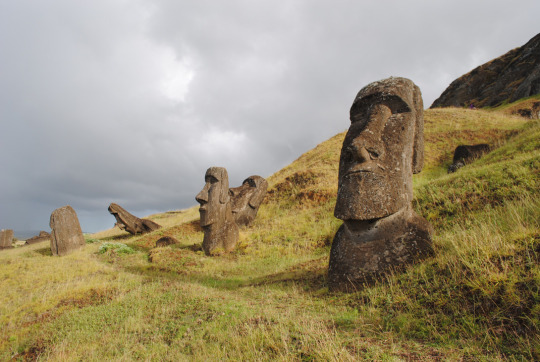
Moai chieftain statues are the famous massive megaliths of Rapa Nui (aka Easter Island) in eastern Polynesia, carved about 1250-1650 CE by the original Polynesian colonizers of the island.
Many know them as "Easter Island heads," a misconception from having seen photos of statues in the volcano Rano Raraku partitially covered with soil. They all have full bodies with over-large heads - a 3:5 ratio between head and trunk, a sculptural trait consistent with the Polynesian belief in the sanctity of the chiefly head.

The island holds nearly 1000 statues, each weighing as much as 90 tons and standing up to 10 meters tall, though they average around half that. One unfinished sculpture would have stood 21 meters (69 feet!) tall and weighed 180 tons. More statues are still being discovered.
Almost all (95%) of the moais were carved from the volcano's stone tuff - compressed volcanic ash that's relatively easy to carve using only stone tools (toki).
Probably the biggest mystery is how tribes using Stone-Age tech could succeed in transporting 50-ton moai statues across kilometers of hilly terrain. Because the island was largely treeless by the time Europeans first arrived (by which time local culture and history had largely collapsed), the movement of the statues was a mystery for a long time.
Some transportation theories are more accepted than others:
The earliest accounts say a king named Tuu Ku Ihu moved them with the help of the god Makemake, while later stories tell of a woman who lived alone on the mountain ordering them about at her will.
The longest-held European hypothesis was that the moai statues were dragged from the volcano to their destinations along log rollers, which also explained how the island became deforested. Pollen analysis has established that the island was almost totally forested until 1200 CE, and tree pollen disappears from the record by 1650.
However, Iceland demonstrates how simply using wood for construction and fire can quickly deforest an island.

According to oral tradition, the moai statues walked to their destination. A literal interpretation is that the statues were rocked from side to side while pulling them forward to "walk" them to their final sites, as demonstrated in this recent experiment. This theory holds the most scholarly support today.

A not-uncommon but highly unlikely (and, y'know, disrespectful) claim is that aliens placed the moai statues for the locals. Occam's razor suggests this probably isn't the answer. But everyone loves aliens. The debate continues.
The ancient period ended when the Rapa Nui people were devastated by Peruvian slave-raiding expeditions that reached the island in 1862. Within a year, the individuals who remained on the island were sick, injured, and lacking leadership. Survivors of the slave raids had to deal with Christian missionaries. By the time Europeans arrived in 1722, the island's population was estimated at less than 3,000. Foreign diseases and emigration to other islands such as Tahiti further depleted the population, reducing it to a low of 111 native inhabitants in 1877.
Chile annexed the island in 1888, but it wasn't until 1966 that the Rapa Nui were granted Chilean citizenship. The 2017 census registered 7750 people on the island, of whom 3512 (45%) consider themselves Rapa Nui.
The original inhabitants live on among their famous megaliths.
114 notes
·
View notes
Text
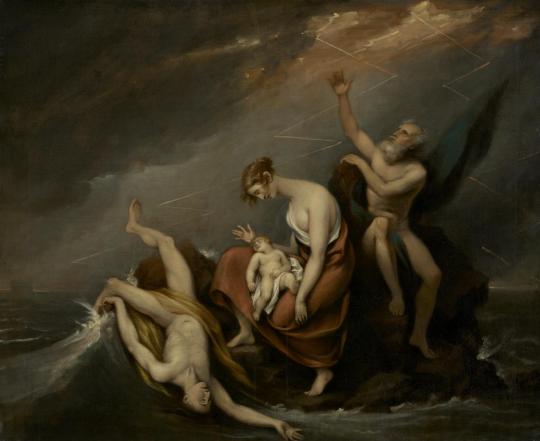
The Last Family Who Perished in the Deluge (Genesis 7:4-24)
Artist: John Trumbull (American, 1756–1843)
Date: 1838–1839
Medium: Oil on canvas
Collection: Yale University Art Gallery, New Haven, Ct, United States
The Purpose of the Flood in the Times of Noah
Genesis 6 gives the sad account of the state of humanity prior to the worldwide flood during the days of Noah. Genesis 6:5 states, “The LORD saw how great the wickedness of the human race had become on the earth, and that every inclination of the thoughts of the human heart was only evil all the time.” The level of sin and corruption among the human population was staggering: people thought about doing evil “all the time.” The evil of humanity would have resulted in disease and bloodshed and death. The weak or unhealthy (babies, children, women, and the disabled) would have been exploited and constantly put in harm’s way because of the evil actions of others.
In addition, “The sons of God saw that the daughters of humans were beautiful, and they married any of them they chose” (Genesis 6:2). In the Hebrew language, these “sons of God” were “bene elohim.” This term is usually applied to angels (see Job 1:6). Genesis seems to be stating that, somehow, there was a physical union between angels and human women. The unnatural offspring of this union were the “Nephilim” (Genesis 6:4). The word Nephilim is directly transliterated from the Hebrew. The ancient root of the word implies a “fall.” Whatever the word actually means (in some versions of the Bible it is translated as “giants”), Scripture describes the Nephilim as “the heroes of old, men of renown.” Some theologians believe that God could simply not allow this corrupt offspring to exist on the earth, and that was part of the reason for the flood.
What can be understood without question is that the world that was then, the world of Noah, was incredibly corrupt and perverted. Genesis 6:6 tells us that “the LORD regretted that he had made human beings on the earth, and his heart was deeply troubled.” The Lord’s “regret” is unlike ours. Creating mankind in the image of God was not a “mistake” on the part of the Lord. The Hebrew word nahem can also be translated “grieved.” The depraved actions of mankind grieved God in His most holy heart.
God responded to man’s sin in a holy and righteous manner, but also in a way that salvaged mankind. “So the LORD said, ‘I will wipe from the face of the earth the human race I have created - and with them the animals, the birds and the creatures that move along the ground- for I regret that I have made them.’ But Noah found favor in the eyes of the LORD” (Genesis 6:7–8). Yes, all people on earth died except the eight people who were found righteous in the eyes of God: Noah, Noah’s wife, and Noah’s three sons and their wives. Scripture indicates that Noah testified to the world about the coming flood for 120 years. The people who perished in the flood died because they refused to acknowledge God or seek His forgiveness. Noah, on the other hand, is described as righteous, blameless, and obedient in that he “walked with God” (Genesis 6:9).
Noah and his family became our ancestors. The polluted, unrighteous population of the world of Noah disappeared from the earth. Mankind was salvaged, and from the line of righteous Noah came the Son of Man, Jesus Christ our Lord, who died to save those who call upon His name.
#biblical art#painting#fine art#oil on canvas#christianity#the flood#book of genesis#family#deluge#biblical scene#john trumbull#american painter#american art#holy bible#19th century painting#artwork
16 notes
·
View notes
Note
Tbf the life expectancy being so low in the past has a lot more to do with high rates of infant and child mortality and people dying in childbirth rather than people dying young once they reached adulthood (though I will say post industrial revolution a lot of people did die young from being worked to death, factory accidents, etc before basic labor laws were implemented). On the other hand, my sister had her first gray hair at 9, so premature graying definitely has always been a thing.
Also sorry if this comes off as condescending or anything, this is a really common misconception and it's not a big deal! You just unlocked the history nerd part of me, so I wanted to talk about it a bit!!
yes, i did know about this and don’t worry, you didn’t come off as condescending! as a fellow history nerd i can understand the compulsion (although, my focus is on ancient civilisations rather than the 19th century).
however, i read a study a while ago which showed that (more notably) starting in the late 1800s (more specifically in those born after 1880), women had a higher life expectancy than men. men aged between 50-70 were twice as likely to die than women. this is believed to be because men were more susceptible to cardiovascular diseases than women (although life expectancy did generally increase in both due to germs becoming more understood). so, this is kind of what i was thinking about, but until i just found the paper and re-read it, i couldn’t remember the exact numbers and just took the ones i saw on google as the correct-ish ones without taking infant/child deaths bringing the curve down to about 40yo into account.
obviously, this doesn’t entirely work with helsing because they were born prior to 1880, but i just thought those stats were funny in relation to the older helsing ask, considering helsing can be only a year off of 40 if that’s what the reader decides.
obviously, as you said, premature greying is a thing, so helsing can absolutely achieve their older look lol!
link to the study for anyone who is interested:
https://doi.org/10.1073/pnas.1421942112
(some of the studies they reference are quite interesting as well, but many of them you need to either pay or have university or work access).
#thank you for the ask!#i hope this makes sense but it probably doesn’t#forgive my rambling#queued post
22 notes
·
View notes
Text
Doumeki's irezumi
Irezumi (入れ墨, lit. 'inserting ink') is the Japanese word for tattoo, and is used in English to refer to a distinctive style of Japanese tattooing.
In chapter 53, Doumeki's back tattoo is revealed to be a "celestial maiden". Typically, irezumi incorporates motifs such as dragons, Buddhas, samurai, koi fish, and more, each carrying specific cultural and symbolic meanings referred to as wabori (和彫り). Intrigued by Doumeki's tattoo, I went asking if Doumeki’s tattoo is identified as any wabori and received responses suggesting it could represent either Nuwa (女媧) or Benzaiten (弁才天), given the details of snake and the stone in the goddess’ hands. After some research, Nuwa (女媧) seems to be more aligned with the story than Benzaiten (弁才天). However, I still present both of them and their possible interpretations in the story.


I. Nuwa (女媧)
Nüwa, is a mother goddess, cultural heroine in Chinese folk religion, Chinese Buddhism, Confucianism and Taoism. She is credited with creating humanity from clay by the river bank and repairing the Pillar of Heaven. Let’s focus on the myth of “repairing the Pillar of Heaven”.

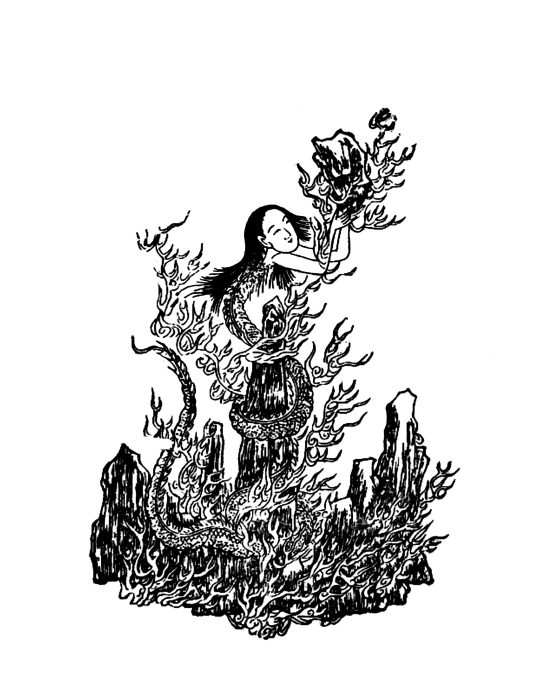
The world of the first beings was very different from ours now. The earth was just in its infancy and was only separated from the sky by four very large pillars. One day, Gonggong (龔工), the god of water, and the god of fire, Zhurong (祝融) became locked in a massive battle that would determine the ruler of heaven. Gonggong, who was motivated by evil, ultimately lost the fight and crashed his head against Buzhou mountain—one of the four pillars holding up the heavens. The earth began to tremble and the pillar collapsed and ripped a hole in the sky. At this point, the earth was completely in tatters from Zhurong and Gonggong’s epic battle. Fires had scorched the earth, water was pouring incessantly from the hole in the sky. The ancient Chinese historian Sima Qian (司馬遷), recorded the following account of Nüwa’s heroic deed: “Hereupon Nüwa melted stones of the five colours to repair the heavens, and cut off the feet of the tortoise to set upright the four extremities of the earth. Gathering the ashes of reeds she stopped the flooding waters, and thus rescued the land.” From that moment on, the water in the heavenly palace no longer cascades on earth to cause harm to the people.
In mythology, Nuwa played a crucial role in repairing the sky hole and preventing heavenly water from pouring onto the earth. As rain – the water from the sky, the befallen suffering, is one of the main themes of Saezuru, the parallel is pretty evident. Given Doumeki’s persistence to stay in the yakuza world and his decision to have a wabori that big on his back, he is doing everything he can to manifest his devotion to stay on Yashiro’s side, end his suffering and protect him from any potential harms, even though up to the newest developments of the story, it doesn’t seem likely at all. They’re both confused and hurting each other.
II. Benzaiten (弁才天)
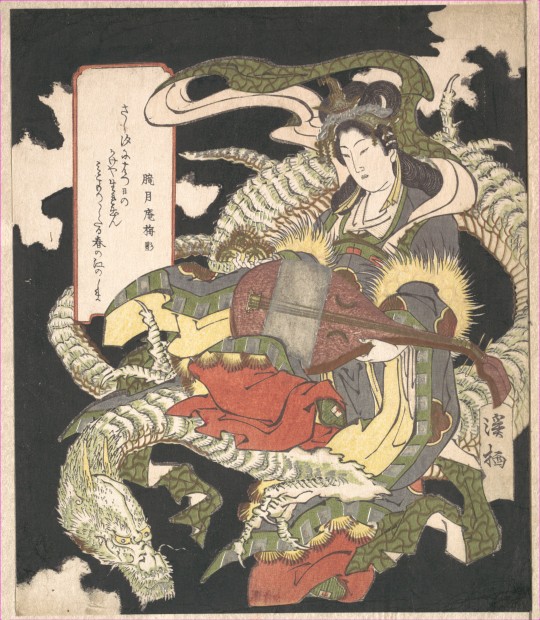
Benzaiten ( 弁才天 ) is the “goddess of eloquence" who originated mainly from the Hindu Indian Saraswati, goddess of speech, the arts, and learning. While Benzaiten retains many of the Indic attributes of Saraswati (as patron of music, the arts, eloquence, knowledge), she also has many unique aspects, roles and functions which never applied to the Indian goddess. As such, Benzaiten is now also associated with dragons, snakes, local Japanese deities, wealth, fortune, protection from disease and danger, and the protection of the state. Benzaiten is depicted in a number of ways in Japanese art, one of which is her portrait wielding a sword and a wish-granting jewel (cintāmaṇi). Eloquence and wish-granting? I haven’t been able to draw the parallel to Saezuru yet.
So I’d stick to the interpretation that Doumeki’s tattoo is Nuwa.
#saezuru tori wa habatakanai#saezuru#twittering birds never fly#doumeki chikara#囀る鳥は羽ばたかない#irezumi#celestial maiden#nuwa#mythology#yoneda kou#yaoi manga#tattoos
47 notes
·
View notes
Note
How important was it, really, that Alexander didn't have more brothers? He had Karanos, and it there's the gossip that ATG or his mother killed the boy. Philip Arridhaios apparently wasn't seen as a direct challenge and ATG kept him around. But if Philip had more healthy male offspring around Alexander's age, would that have threatened his hold on power, the partition of the empire or even the military campaigns themselves (the brothers becoming generals for example)?
Philip’s (Lack of) Sons
So, first I need to correct the bit about Karanos. He didn’t exist. Justin gave baby Europē a sex-change. No historian reports two children for Kleopatra Eurydikē, and Justin alone names a boy. We get two children when modern historians try to reconcile Justin and Diodoros/others. But Justin gets things wrong a lot. So, where Justin disagrees with other historians, I’ll go with the others (especially if it’s more than one). Justin wasn’t simply epitomizing Pompeius Trogus; he had his own agendas and themes, so he changed things when it suited him.
Therefore, “Karanos” = Europē,* born just a few days (maybe a week or two) before Philip’s murder.
The wives and children of Philip are reported in a fragment from Satyrus preserved in Athenaeus (13.557b-c). Of his (living) children, we have four girls (Kynannē, Kleopatra, Thessalonikē, and Europē), and only two boys (Arrhidaios and Alexander).
I specify living because ancient accounts don’t usually list children who died young unless it somehow impacted events. So, the murder of Europē, which led to the suicide of Kleopatra Eurydikē, means Europē got a mention whereas if she’d died of some childhood disease, we’d probably not hear about her.
Ergo, it’s possible Philip did sire other children who simply didn’t survive long enough to make it into the histories—especially if they’d been born (and died) in his earlier years. In Dancing with the Lion, I invented a son (Menelaos) by the shadowy Phila of Elimeia, who died young, specifically to illustrate that point.
The two-to-four ratio of boys to girls suggests Philip fathered girls more than boys. Would more boys have endangered Alexander’s place? Certainly, if they were around his age. But not if they were notably younger—another point I make in Dancing with the Lion: why Alexander is less upset by Philip’s seventh marriage than his mother. The chance that Kleopatra Eurydike might bear a male child threatened Olympias’s position far more than Alexander’s. Even some of my colleagues seem to forget that. While yes, sons and mothers did form a political unit at polygamous courts, that doesn’t mean that threats to the mother’s status necessarily entailed threats to a son’s. Philip’s marriage to Kleopatra Eurydikē was just such a case. Any son she produced would’ve been so far behind Alexander in achievements (and thus, a shot at the throne), that the marriage was no threat—which is why he attended the wedding. That makes events at the wedding very curious indeed! And convinces me that we don’t even begin to have the whole story there.
I made up some things in Rise (no spoilers), precisely because we don’t know and I had to come up with something that didn’t make Alexander into a reactionary rube. Too often people point to him as a “hotheaded youth” who made a mountain out of a molehill at his mother’s instigation. Folks, he was eighteen or nineteen. Hotheaded (always), but not some little kid to jump at shadows and Mommy’s tales. Something truly threatening generated that level of reaction from him (and beyond what Diodoros relates at the wedding). It wasn’t fear of being replaced by an as-yet-not-even-conceived infant brother--unless Philip had other reasons to replace him, and there weren’t any … on the face of it.
Anyway, I want to end by pointing to the Big Pink Elephant in the room that way too many people seem to forget….
AMYNTAS PERDIKKA was Alexander’s chief rival, not Arrhidaios or a fictional infant brother. Amyntas was older than Alexander, the only son of Philip’s older brother Perdikkas (III), who’d been king before Philip. Amyntas didn’t become king when his father died in battle precisely because he was only about a year old, while Philip was c. 23/24, and the kingdom was in crisis. Being a baby was also why Philip didn’t kill him. He needed an heir until he could father his own.**
So despite being the eldest Argead after Philip and the legitimate son of a former king, Amyntas spent his life as “the spare.” Imagine the resentment that would have generated. It’s not an accident that Alexander had him killed inside six months of taking the throne. And it’s probably in that time frame that Amyntas would’ve staged a bid for the throne himself. After all, not only was he an Argead, with military experience, he was married to Philip’s eldest child, who was already pregnant, showing he was fertile. He had a really good claim.
Such a clearing out of competing Argeads was standard for any new king’s first year or so. It’s what whittled down available Argead males from the five sons (and progeny) of Alexandros I to just three at Philip’s death, a hundred years later: Amyntas, Alexander, and Arrhidaios. Alexander wasn’t unique in house-cleaning. Philip had killed his three half-brothers upon taking the throne, keeping only Amyntas, his nephew. This was so typical it’s of note that Alexandros II not only didn’t get rid of Perdikkas (III) or Philip (II), but kept around his half-brothers too. It was the exception, not the rule (perhaps because all of them were still too young to be a threat?).
So basically, given Argead patterns, the survival of male siblings/cousins depended on a couple things:
The age of the sibling(s)/cousins. Siblings and half-siblings who were notably younger were likely to be spared if they didn’t appear to offer an immediate threat. After all, the new king needed an heir until he could father his own.
The apparent competence of the sibling(s)/cousins. Arrhidaios is our best evidence for this: Alexander took him with him to Asia to keep an eye on him—prevent his use as a stooge in a coup—but he otherwise kept him alive.
The king’s personal relationship with the sibling(s)/cousins. This is obviously very hard to determine, as our sources may not tell us, or not tell us honestly, but even if it’s hard, that doesn’t mean we should neglect it as a possible motivating factor. It may, in fact, explain why Alexander II (Philip’s older brother) didn’t kill his siblings. He may have loved them (and them, him). While we can’t say from the evidence, we also shouldn’t dismiss that as a possible motivating factor.
Here's an earlier posts about Amyntas, btw.
AMYNTAS PERDIKKA
* The names themselves are a give-away. “Europē,” like “Thessalonikē” was bestowed in celebration of Philip’s military victories. By contrast, “Karanos” (which means generic “chief”) isn’t a royal Macedonian name at all. Bill Greenwalt talks about the name’s significance in one of his articles, but I can’t now recall which.
** There is some question as to whether Amyntas was ever king, however briefly, due to a reference to an “Amyntas IV.” But many of us believe that was part of a challenge to Alexander later, not proof that Amyntas was king briefly, and Philip his regent.
#asks#Philip II of Macedon#Philip of Macedon#Alexander the Great#Arrhidaios#Perdikkas III of Macedon#Alexander II of Macedon#Amyntas Perdikka#ancient macedonia#Argead Macedonia#Inheritance in Argead Macedonia#Karanos#Justin lies
26 notes
·
View notes
Text
Above all else it should be universally acknowledged that pregnancy is an injury you never fully recover from
After you give birth you have a dinner plate sized wound inside of you.
Your pelvic floor never ever recovers. Pelvic floor therapy helps but can never fully restore your strength, and it gets worse and worse with each vaginal delivery.
You experience incontinence, painful sex, weaker/fewer/no orgasms and pleasure
It's not uncommon for your vagina to literally tear apart during delivery (this is made worse w/ western medical practices that make women lay down on their backs, which is not the optimal way to give birth vaginally)
And C sections are a whole other issue b/c C sections are intense abdominal surgeries where the nerves that connect to the clitoris and the sensitive areas inside the vagina and on the vulva are all in the line of fire and can be severed. If that happens to you then you're just plain SOL! This can be improved w/ further research into bodies that can give birth, but point being that being cut open like a fish should not be considered an acceptable alternative.
Also it's very common to get gum disease, cavities, and other dental issues due to morning sickness and the fact that your body is literally siphoning calcium from your teeth (and your bones!)
There's a reason why in so many religions and cultures pregnancy and childbirth are considered women's punishment for being mischievous, stupid, etc. And then take into account how common it is to die in childbirth. Ancient peoples were more in touch with and honest about the brutality of this and their societies wielded it to men's advantage
And because of all of this, there is a part of me that believes you have to be sorta kinda evil to inflict this upon someone else. Looking at it without cultural baggage, how is it any different from beating someone to a pulp?
So why is only ~50% of the population capable of pregnancy and childbirth? Well it's evolutionarily advantageous to have different types of bodies that do different things, esp. Something as risky and lethal as childbirth, because less death is pretty much always a good thing. That's really truly the only reason, but as per usual humans have mythologized it in a million ways, none of them accurate or helpful.
Its important to know that pre-agricultural humans didn't have dozens of kids, and that pregnancy and childbirth were made significantly less miserable by the lack of misogyny and the fact that after you were done breastfeeding you were no longer the primary caretaker of that child. Remember this was before children were legally considered property. Add to that the fact that ppl have been pulling out & tracking their cycles since forever. These are not super effective methods of contraception but they do work a certain percentage of the time.
Interestingly pregnancy, childbirth, and motherhood are almost never radicalizing experiences for women, (though they should be), but rather women often sink deeper into the clutches of oppression. They think they are better for having endured this because that's the only way they can rationalize why it happened. Looking at the situation logically women's quality of life decreases in every single meaningful way during pregnancy and motherhood.
The reasons women as a class are in such denial over this are multifaceted but imo it basically comes down to women and girls not being afforded enough accessible opportunities in society to actually make something of themselves whereas getting pregnant is very accessible (most can do it) and getting pregnant and being pregnant cost no money theoretically. This is most obvious when you examine the phenomenon of teenage pregnancy, where the girls who seemingly enthusiastically give birth to and raise their children (as opposed to getting abortions or giving the baby up for adoption) are pretty much universally impoverished, socially ostracized, not high achievers, come from dysfunctional or abusive families, and end up spending their lives addicted to substances and/or the attention of men and/or their child(ren).
Then there is the fact that pretty much everybody has been abused or traumatized during their upbringing (women especially, because little girls are lightning rods for the violence of the family and patriarchy) and consciously or not relish in the idea of unleashing that onto someone more vulnerable because that is the only way they know how to process what theyve been through. For women, motherhood is the easiest way to accomplish this, because the opportunities afforded to men to achieve this same goal are typically less accessible. I really believe that being a parent (the way we define being a parent currently, not simply reproducing) is similar to being a cop in that it's a role that exists for the sole purpose of committing abuse and maintaining oppression
Tldr abolish the family and invest all time money and other resources into artificial wombs now!
9 notes
·
View notes
Text
Zeus: god of thunder and the sky. He is considered the ruler, protector, and father of all gods and humans.
Hera: goddess of marriage, family, childbirth, and woman. She was the wife and sister of Zeus, and many of her most famous myths center around her jealous retributions to Zeus's infidelity.
Poseidon: god of the sea (and water in general), earthquakes, and horses. He was one of the most powerful gods in ancient Greek mythology, Poseidon was held responsible for earthquakes, rivers, floods, droughts, and anything involving water in general.
Demeter: goddess of harvest and agriculture. This was a hugely important role, which gave her the power to sustain life through the growth of all plants and grains, particularly cereal grains.
Ares: god of war and more properly the spirit of battle. He represented the distasteful aspects of brutal warfare and slaughter. Ares was noted for his beauty and courage, qualities which no doubt helped him win the affections of the Greek goddess Aphrodite.
Athena: goddess of wisdom, craft, and warfare. In wars where she was most commonly depicted, Athena embodied cold rationality, tactics, and strategy. Athena's cold logic stood in direct contrast to her brother Ares' rage, violence, and impulsiveness.
Apollo: god of archery, music and dance, truth and prophecy, healing and diseases, the sun and light, poetry, and more. One of the most important and complex of the Greek gods, he is the son of Zeus and Leto, and the twin brother of Artemis, goddess of the hunt. He is considered to be the most beautiful god and is represented as the ideal of the Kouros (ephebe, or a beardless, athletic youth).
Artemis: goddess of the hunt, the wilderness, wild animals, nature, vegetation, childbirth, care of children, and chastity. Artemis was very protective of her purity and gave grave punishment to any man who attempted to dishonor her in any form. Like all the Greek Olympic gods, Artemis was immortal and very powerful. Her special powers included perfect aim with the bow and arrow, the ability to turn herself and others into animals, healing, disease, and control of nature.
Hephaestus: god of artisans, blacksmiths, carpenters, craftsmen, fire, metallurgy, metalworking, sculpture, and volcanos. In Greek mythology, Hephaestus was either the son of Zeus and Hera or he was Hera's parthenogenous child. He was cast off Mount Olympus by his mother Hera because of his lameness, the result of a congenital impairment; or in another account, by Zeus for protecting Hera from his advances (in which case his lameness would have been the result of his fall rather than the reason for it).
Aphrodite: goddess of love, lust, beauty, pleasure, passion, procreation, desire, sex, fertility, prosperity, and victory. Florence
Aphrodite is usually said to have been born near her chief center of worship, Paphos, on the island of Cyprus, which is why she is sometimes called "Cyprian", especially in the poetic works of Sappho. The Sanctuary of Aphrodite Paphia, marking her birthplace, was a place of pilgrimage in the ancient world for centuries.
Hermes: god of boundaries, roads, travelers, thieves athletes, shephards, commerce, speed, cunning, wit, and messages. Hermes was considered the messenger of the Olympic gods. According to legend, he was the son of Zeus, king of Mount Olympus, and Maia, a nymph. As time went on, he was also associated with luck, shepherds, athletes, thieves, and merchants.
Dionysus: god of wine making, orchards and fruit, fertility, festivity insanity, tuition insanity, religious ecstacy, and theatre. The son of an immortal god and a mortal princess, Dionysus’ role forged a crucial link between humanity and the divine, serving as a force of cyclical, unbridled nature who drew men and women out of themselves through intoxication. In that sense, Dionysus, a genial but wild and dangerously ravishing intermediary, represents one of the enduring mysteries and paradoxes of life.
#percy jackon and the olympians#percy pjo#percy jackson#percy series#percy jackson books#pjo season 1#pjo spoilers#pjo fandom#pjo series#pjo tv show#pjo#pjo percy#pjo annabeth#pjo grover#grover pjo#polls on tumblr#fandom polls#tumblr polls#my polls#polls#tumblr poll#poll#fandom#fandom poll
43 notes
·
View notes
Text
I think I've found the wildest piece of music history in existence. So I went to a audio/visual store today, and they had vintage cassettes, and I was amazed to find a Travelling Wilburys one. The Travelling Wilburys were a musical supergroup consisting of Bob Dylan, George Harrison, Jeff Lynne, Roy Orbison, and Tom Petty. (I've linked their most popular songs, just in case you're not sure who they are.) So I was very excited to add it to my collection. (Side note: it plays great.) Upon opening it up this evening, I was looking at the inside pamphlet, you know, the kind that has designs and track lists and such. And I found an incredible piece of fake lore for the band, which I have typed out (CW for brief racial stereotype):
“The etymological origins of The Traveling Wilburys have aroused something of a controversy amongst academic circles. Did they, as Professor “BOBBY” Sinfield believes, originate from the various Wilbury Fairs which travelled Europe in Medieval times, titillating the populace with contemporary ballads, or rather, were they rather derived from “YE TRAVELLING WILLYBURYS”, who were popular locksmiths during the Crusades used to picking or unlocking jammed chastity belts (rather like today’s emergency plumbers.) Dr. Arthur Noseputty of Cambridge believes they were closely related to the Strangling Dingleberries, which is not a Group but a disease, an unpleasant form of crotch-rot; arguing that a “WILLBERRY” is often used as an expression for a piece of crud found in the crevice of an ancient pair of y-fronts; but I think this can be discounted, not only because of his silly name but also from his habit of impersonating Ethel Merman during lectures. Some have even gone on to suggest tenuous links with the Pillsburys, the group who invented Flour Power. Dim Sun, a Chinese academic, argues that they may be related to “THE STROLLING TILBURYS”, Queen Elizabeth the first’s favourite minstrels, and backs this suspicion with the observation that The Travelling Wilburys is an obvious anagram of “V. BURYING WILL’S THEATRE”, clearly a reference to the closing of Shakespeare’s Globe theatre by Villiers during an outbreak of plague. This would account for the constant travelling. Indeed, many victims of plague and St. Vitus’ dance literally danced themselves to death, and it is this dancing theme that resurfaces with The Wilbury Twist. Not a cocktail but a dance craze, reminiscent of The Wilbury Quadrille made famous at Bath in 1790 by Beau Diddley, and the Wilbury Waltz, which swept Vienna in the 1890’s. One thing, however, remains certain. The circumambulatory peregrinations of these itinerant mundivagrant peripatetic nomads has already disgorged one collection of popular lyrical cantata, which happily encapsulated their dithyrambic antiphonic contrapuntal threnodies as a satisfactory auricular experience for the hedonistic gratification of the hoi polloi on a popular epigraphically inscribed gramophonic recording. Now here’s another one. Tiny Hampton (Professor “TINY” Hampton is currently leading the search for Intelligent Life amongst Rock Journalism, at the University of Please Yourself, California.)"
(I've included links that might help contextualize the jokes/puns/references that I could pick up on.)
HELLO?????? WHICH ONE OF THEM WROTE THIS I NEED TO KNOW
And APPARENTLY, they all had Wilbury personas.
And BEST OF ALL, they named their SECOND ALBUM (which this is pulled from), "VOL. 3". IM WHEEZING.
#travelling wilburys#traveling wilburys#bob dylan#george harrison#jeff lynne#tom petty#roy orbison#classic rock#music#my stuff#music history
11 notes
·
View notes
Text
Today, people tend chiefly to remember the healings of Jesus – and not without reason. These miracles played so prominent a part in the early Christian message that one historian of early Christianity, Adolf von Harnack, bluntly wrote that ‘Christianity is a medical religion.’
But Christianity wasn’t the only medical religion. This was a world that could glitter with miracles and be moved by the hand of heaven. One Greek text – from the third century BC – praises a divine ‘gentle healer’ for the ‘diseases that thou didst wipe away, Lord, by laying on us thy gentle hands.’ One single ancient stone – inscribed in the fourth century BC – gives grateful thanks to a god from a group of supplicants who have variously had ‘the sight of both eyes restored’, had their lameness healed and been cured of paralysis. Long before Jesus arrived on earth, there were many who took up their beds, and walked.
Accounts in which the blind were healed and the lame walked were perennially popular – perhaps, a cynic might say, because they were easiest to fake. (Accounts in which amputated limbs regrew are rather harder to find in the historical record.) Some of these stories became particularly celebrated. In the first century AD, in the East, a prophecy started to circulate that said men would come from Judaea who would rule over the entire world.
Many came to believe that the prophecy had referred to the emperor Vespasian – not, it must be said, without reason, since he did. Certainly he seems to have been touched by heavenly powers. One day, after he had visited a temple, two sick men approached him. One of the men was blind, the other lame, and they implored him to heal them.
Vespasian was reluctant; he was both sceptical that such a stunt would work and had a lot to lose and little to gain from attempting it. As the historian Suetonius records, ‘he could scarcely believe that the thing would any how succeed, and therefore hesitated to venture on making the experiment.’ Vespasian was eventually jollied, or perhaps bullied, into it by the encouragement of his friends and, in public and before a large crowd, did as the men asked, touching the eyes of the blind man with his spittle, and touching the lame man’s heel. His attempt ‘was crowned with success in both cases’. The blind man saw and the lame man walked. For an ancient event, this story is exceptionally well attested. It appears in Tacitus, Suetonius and Dio Cassius – and was clearly widespread in late AD 69 or early AD 70, when it (allegedly) happened.
It is notably similar to other stories told at the time – perhaps most famously in the story that Christians told of Jesus, which was probably written down at about the same time. In this, Jesus is approached by ‘some people [who] brought to him a blind man and begged him to touch him.’ Jesus, more willing than Vespasian to attempt such a thing, immediately helped: he took the blind man and ‘spit on his eyes and laid his hands on him’. Initially, the blind man saw nothing, then ‘he looked up and said, “I see people, but they look like trees, walking.” ’ Then Jesus ‘laid his hands on his eyes again; and he opened his eyes, his sight was restored, and he saw everything clearly.’ It has been suggested that the story of Jesus was tweaked to compete with that of Vespasian.
Christians were initially happy to admit similarities between their own healer and the healers of other religions. ‘When we say that He made well the lame and the paralytic,’ Justin Martyr wrote, ‘and that he resurrected the dead, we seem to be mentioning deeds similar to and even identical with those which were said to have been performed by [the Greek god] Asclepius.’ Asclepius wasn’t the only wonder-worker with whom Christian healers were compared – or perhaps confused. When St Paul and a companion arrived in a town and healed a lame man there, the crowd knew precisely what had happened. ‘The gods have come down to us in the likeness of men!’ they cried. St Paul and his companion were assumed to be, respectively, Hermes and Zeus in human form; so much so that the local priest of Zeus promptly brought wreaths to the city gates ‘to offer sacrifice with the crowds.’
It is Jesus’ healing miracles that are remembered today; but in the ancient world his fame was far eclipsed by that of Asclepius. And, as ancient critics of Christianity didn’t hesitate to point out, the similarities between the two men didn’t stop merely at their miracles. Asclepius was also not merely a son of a god, but was said to be a god on earth: some believed he was none other than Apollo, made flesh in human form.
The similarities went on: Asclepius, like Jesus, suffered a violent death, and was also deified and ascended into heaven. Devoted followers of Asclepius would describe him as being dressed in ‘white raiment and with flowing hair’ and as sitting, as one second-century-AD follower put it, ‘enthroned in the sky’. He too was able to perform all the usual miracles: to make the mute speak and the blind see; to make withered hands work again; to smooth the skin of the leprous, raise the dead and heal the lame. Indeed, in one account, Asclepius, with Apollo’s help, healed a lame man so successfully that, when a small boy stole his crutch, the man instantly got up and ‘pursued him’. He was so loved for his healings that his followers took to calling him ‘Lord’ and ‘Saviour’ and even ‘Saviour of the human race’.
-- Catherine Nixey, Heresy
11 notes
·
View notes